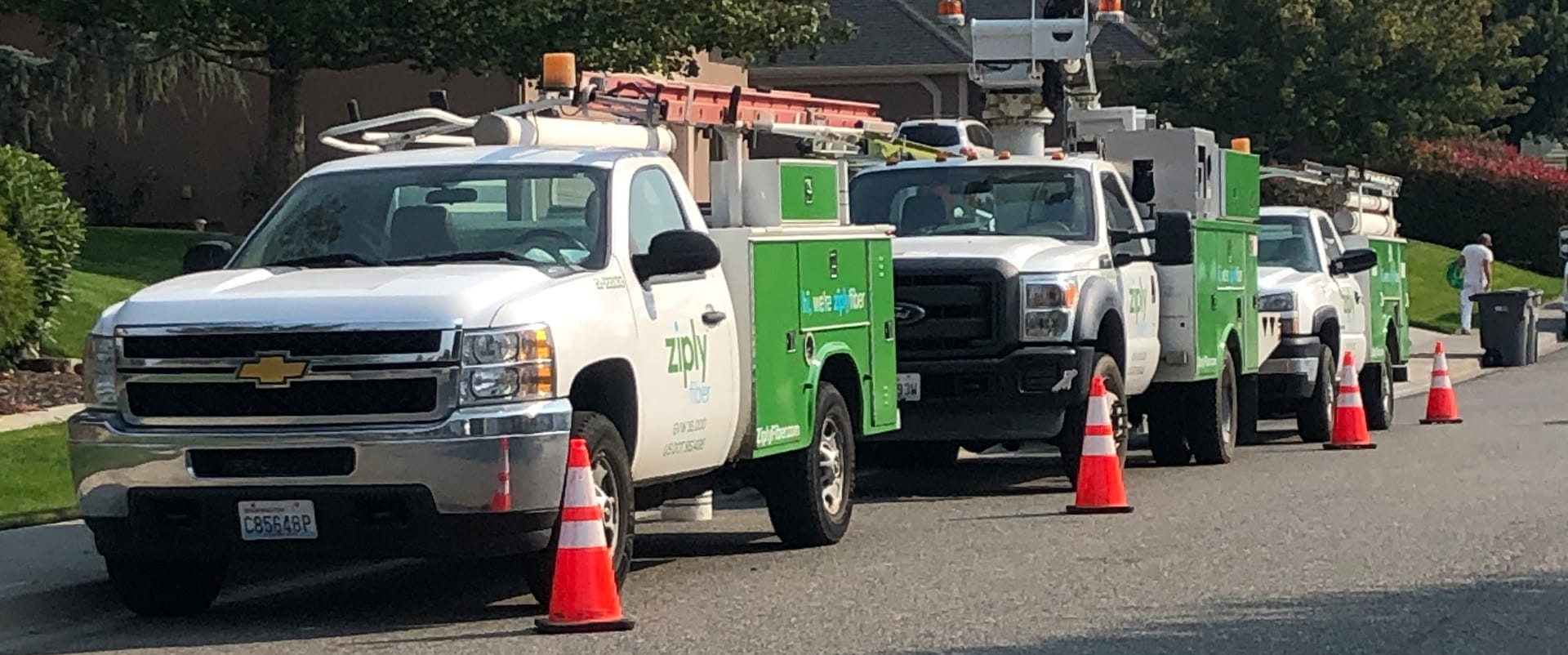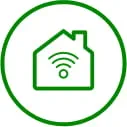Are you operating a business or running IT for one? Then you know that strong, reliable WiFi is crucial. From completing transactions to running video conferences, you need a solid internet connection. Your business may literally depend on it.
That’s where fiber-optic internet comes in. Fiber internet provides a faster and more reliable connection than a traditional cable connection. A better connection can lead to better WiFi coverage for you, your customers, patients, clients, employees — whoever you serve. Even if you’re already sold on fiber, you may be wondering if a business plan is worth it over a home plan when it comes to finding a good WiFi connection.
What is home internet?
Home internet, also called residential internet, brings the internet from your local network to your home for streaming, browsing, gaming and all the things you do online. It’s also necessary for all your smart home appliances, like a Nest thermostat or Ring camera.
The fiber-optic home internet difference
Fiber-optic internet is an improvement over legacy forms of internet, like cable and DSL, as well as satellite internet. Using thin fiber lines, this technology transmits data via pulses of light. It’s durable, reliable and ultra-fast. What’s more, fiber internet provides symmetrical speeds, meaning uploads and downloads travel at the same speed, leading to less lag. Fiber connections are also dedicated, meaning that they go directly to the home, whereas cable connections are shared among neighbors. Sharing doesn’t always mean caring: shared connectivity often leads to peak-time slowdowns that can put a damper on after-work online activities.
Read more: Why you should make the switch to fiber internet
What is business internet?
Business internet can apply to small businesses or big corporations. They generally break out into two categories: small business internet and enterprise, or commercial, solutions.
Commercial internet
If your business is scaling up, or if the small business plans aren’t robust enough or you’re with a company that has large-scale data and security needs, a commercial plan is right for you. Solutions like dedicated Ethernet, dark fiber and colocation are designed for bigger operations. At Ziply Fiber, enterprise customers enjoy the benefits of a locally owned and operated network run by industry professionals, 24/7 support, always-on reliability, access to the Network Operating Center (NOC) and advanced threat mitigation. Plans come with a Service Level Agreement (SLA), ensuring high uptime, faster repairs, and consistent speeds.
Ziply Fiber runs its network below capacity, ensuring that it never gets too congested. It also offers redundant paths on the network, which means if one line goes down or needs a repair, another path can handle the data with no service disruption on the user end.
Check out Ziply Fiber's enterprise plans
Small business internet
Speed-wise, small business internet plans are similar to residential plans. At Ziply Fiber, business owners can choose from a 200/200 plan, a 500/500 plan or a 1 Gig plan — just slightly different tiers than the basic home plans. The two lower speed tiers are higher than the two lowest residential tiers, meaning that even the least expensive and simplest small business plans are more robust than the residential plans.
Read more: Future-proofing your business with scalable fiber solutions
Benefits of fiber internet for small businesses
Bandwidth and speed
Fiber internet’s fast, symmetrical speeds and dedicated connections make small business needs, like transactions, video conferences and large file uploads, easier from the get-go. Unlike cable, which has slower upload speeds and can experience network congestion, fiber provides always-on reliability and mega-fast speed. WiFi for small businesses brings this excellent connectivity to all your wireless devices.
Read more: How fiber improves WiFi
Reliability and support
Has your home internet ever gone out? Then you know the frustration that goes into getting it back up. Whether it’s a disruption on your end or a more serious neighborhood outage, you’re left to troubleshoot on your own, or sit on hold for a customer service representative, and possibly wait for days for a technician to show up and maybe solve the problem.
If you’re running a business, you can’t afford to lose this amount of time on technical difficulties. Even smaller disruptions, like a glitchy video chat or a transaction that gets interrupted, can be the difference between a good customer experience and a bad one. A business plan can alleviate these concerns with network reliability. Many business internet plans also take more of a white-glove approach to support. If customer care is high up on your list, this is something to ask about when searching for the right business plan.
WiFi extenders and voice options
Your business may need a voice system or a wider coverage area. With small business internet, you can opt for whole business WiFi coverage as well as scalable voice services that provide more calling options than a residential phone system. With Ziply Fiber’s Business Voice Unlimited, you get up to 10 phone lines, unlimited long distance and local calling and 18 basic calling features that go beyond a home phone plan.
Ziply Fiber’s Whole Business WiFi plan takes the guesswork out of WiFi extenders, so your entire space is covered and safe from dead zones.
Read more: How to choose the best WiFi extender for your fiber internet connection
Who should choose what?
Home internet is a good choice if
- You use the internet primarily for personal activities.
- Your work-from-home setup involves light usage, like emails and occasional video calls.
- Downtime wouldn’t severely disrupt your life or income.
Business internet is a good choice if
- You run a business that relies heavily on internet connectivity.
- You need phone lines and/or the ability to run bandwidth-intensive activities.
- Downtime or slow speeds would negatively affect your operations or customer experience.
Questions? We’re here to help
If you’re in the Northwest, check your home or business address at ziplyfiber.com. Our representatives can help you walk through the decision process and help you find the fast, reliable internet plan that’s best for your needs.






